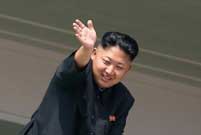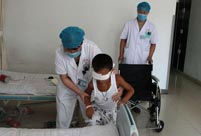DALIAN, Sept. 11 -- The Annual Meeting of the New Champions 2013, also known as Summer Davos, opened Wednesday in northeast China's port city of Dalian.
This year's forum, themed "Meeting the Innovation Imperative," will feature interactive discussions on issues such as sustainable growth, energy security, trade and investment.
"Reform and innovation provide an inexhaustible driving force for a country's development," said Chinese Premier Li Keqiang in his keynote speech at the opening ceremony.
The premier said that China's modernization will not be accomplished without reform, nor will it be achieved without opening up.
He said that since the beginning of the year, China has been successful in coordinating efforts to seek steady growth, conduct structural readjustment and deepen reform, and this is mainly due to "innovation in macro-management."
He said China has kept macroeconomic policy stable, with consideration given to both immediate and long-term needs in the face of economic downturn.
China is implementing an innovation-driven development strategy at a faster pace, aggressively promoting technological innovation and integration of science and technology with the economy, and the country is building a social environment friendly to innovation and business start-ups, said Li.
The premier said the Chinese economy, which is at a crucial stage of transformation and upgrading, is "moving forward steadily and its fundamentals are good."
Li reassured the world about the national economy's health, saying the country will reach its target of 7.5 percent growth this year despite the complex world economic situation.
He pointed to growing signs of stabilization in the world's second-largest economy during the past two months, saying "such development momentum of steady progress gives us confidence that we can meet the economic and social development goals for the whole year."
Li said that growth of around 7.5 percent is still considered high for any major economy in the world, although it is slower than the double-digit growth of the past.
China's economy grew by nearly 10 percent annually in the past three decades until the global financial crisis broke the soaring growth rate four years ago.
Since then, the world's second-largest economy has prioritized quality over speed in a bid to inject more sustainable and vigorous power to guarantee future growth.
"As the economy enters a phase of transformation, the slowdown of its prospective growth and moderation of the Chinese economy from a high speed to a medium-to-high speed are only natural," Li said at the meeting.
Li urged that all countries should open wider to other countries, take a clear-cut position against all forms of protectionism, and work in concert to enlarge the pie of the world economy.
He said China is ready to take a more active part in international governance, share experience with and offer more assistance to fellow developing countries, as well as contribute to a strong, sustainable and balanced world economy.
Summer Davos is an annual gathering of business leaders, government officials and scholars from around the world. More than 1,500 delegates from 90 countries and regions will participate in the three-day forum.
 DPRK holds military parade to mark 65th founding anniv.
DPRK holds military parade to mark 65th founding anniv. Highlights of MAKS 2013 Int'l Aviation and Space Show
Highlights of MAKS 2013 Int'l Aviation and Space Show  10th China-ASEAN Expo opens in Nanning
10th China-ASEAN Expo opens in Nanning Eagle Boy takes to sky to break another record
Eagle Boy takes to sky to break another record 12-year-old boy becomes pillar of the family
12-year-old boy becomes pillar of the family Eye-gouged boy receives blind rehabilitation in Shanxi
Eye-gouged boy receives blind rehabilitation in Shanxi Top 10 naked hotels in the world
Top 10 naked hotels in the world The most gorgeous Chinese women in the eyes of foreigners
The most gorgeous Chinese women in the eyes of foreigners A collection of bizarre rooftop buildings around China
A collection of bizarre rooftop buildings around China Residences of the royal house of Savoy
Residences of the royal house of Savoy China's frigate 'Bengbu'in fire training
China's frigate 'Bengbu'in fire training Fresh students 'forced' to register in university independently
Fresh students 'forced' to register in university independently 2013 Taiwan Int'l Tourism Expo kicks off in Taipei
2013 Taiwan Int'l Tourism Expo kicks off in Taipei Photo story: Take a gap year
Photo story: Take a gap year Nokia's Global Headquarters: visiting a declining empire
Nokia's Global Headquarters: visiting a declining empireDay|Week|Month